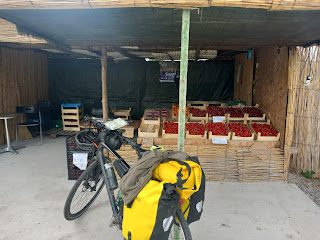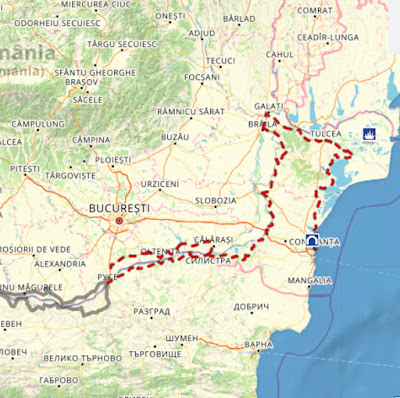It was not until nearly 9am that I set out this morning, fully enjoying the cool comfort of my cheap hotel and putting off the moment of departure into the morning heat until I felt I no longer could.
It was a five mile cycle to the town of Silistra and my entry point back into Romania; no lorries or cars this time at this quiet border crossing, just me in what felt like a remote outpost of the country. By 9.45am I was back in Romania and heading east on the road that runs out of town and to Constanta. It was small, quiet and smooth, and enjoyable to cycle despite the initial extended ascent that took me up the valley side with, when the terrain allowed, fabulous views of the river before dropping down again. The day continued in the same fashion: a long but steady ascent, an undulating ridge line, a descent to a village on the flood plain and a nice flat ride until the next ascent. I worked my way through a series of tiny, simple villages through the still and the heat of morning while surrounded by fruit trees, vineyards and on one occasion a vast swathe of purple lavender. I rested under the shade of a mulberry tree, enjoying its produce, and I stopped at a roadside seller to buy cherries (I had eaten my strawberries last night). I stopped again, this time for coffee and extra water in the larger village of Bǎneasa, the shop a twin of the one in which I had met Marcel three days ago. I also tracked down the cash machine there that I had been told about: cash is king in Serbia, Bulgaria and Romania, especially in more remote parts and I did not want to be caught out, having the need to keep myself well fed and watered on what will be a hilly few days.My turn away from Constanta and to the north was only a few miles further along, the road and journey similar to the start of the day. During the morning I had noticed that there was an increasing amount of water on the lower ground with lakes, marsh and reed beds. Now the hillsides were a patchwork of green and gold rolling fields, the colours and contours of home. However, the heat and those hills were taking their toll and by early afternoon I was looking for somewhere to camp. The place I found was scenic enough, nestled back in elder tress and shrub but not in the cool and shade of woodland which was what I had been hoping for. But by now just stopping trumped stopping at the perfect place.
It is now 5.30, I have eaten, dozed, and been woken by the sound of thunder and rain outside. I have no reason to venture from the comfort of my tent so I guess my time is best spent allowing my body to recover from the exertions of the day.

















































